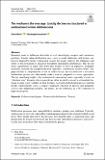| dc.contributor.author | Klein, Mark | |
| dc.contributor.author | Majdoubi, Nouhayla | |
| dc.date.accessioned | 2024-05-13T16:18:09Z | |
| dc.date.available | 2024-05-13T16:18:09Z | |
| dc.date.issued | 2024-05 | |
| dc.identifier.issn | 1386-145X | |
| dc.identifier.issn | 1573-1413 | |
| dc.identifier.uri | https://hdl.handle.net/1721.1/154928 | |
| dc.description.abstract | Humanity needs to deliberate effectively at scale about highly complex and contentious problems. Current online deliberation tools—such as email, chatrooms, and forums—are however plagued by levels of discussion toxicity that deeply undercut the willingness and ability of the participants to engage in thoughtful, meaningful, deliberations. This has led many organizations to either shut down their forums or invest in expensive, frequently unreliable, and ethically fraught moderation of people's contributions in their forums. This paper includes a comprehensive review on online toxicity, and describes how a structured deliberation process can substantially reduce toxicity compared to current approaches. The key underlying insight is that unstructured conversations create, especially at scale, an “attention wars” dynamic wherein people are often incented to resort to extremified language in order to get visibility for their postings. A structured deliberation process wherein people collaboratively create a compact organized collection of answers and arguments removes this underlying incentive, and results, in our evaluation, in a 50% reduction of high-toxicity posts. | en_US |
| dc.publisher | Springer Science and Business Media LLC | en_US |
| dc.relation.isversionof | 10.1007/s11280-024-01269-0 | en_US |
| dc.rights | Creative Commons Attribution | en_US |
| dc.rights.uri | https://creativecommons.org/licenses/by/4.0/ | en_US |
| dc.source | Springer US | en_US |
| dc.title | The medium is the message: toxicity declines in structured vs unstructured online deliberations | en_US |
| dc.type | Article | en_US |
| dc.identifier.citation | Klein, M., Majdoubi, N. The medium is the message: toxicity declines in structured vs unstructured online deliberations. World Wide Web 27, 31 (2024). | en_US |
| dc.contributor.department | Massachusetts Institute of Technology. Center for Collective Intelligence | |
| dc.relation.journal | World Wide Web | en_US |
| dc.identifier.mitlicense | PUBLISHER_CC | |
| dc.eprint.version | Final published version | en_US |
| dc.type.uri | http://purl.org/eprint/type/JournalArticle | en_US |
| eprint.status | http://purl.org/eprint/status/PeerReviewed | en_US |
| dc.date.updated | 2024-05-12T03:11:48Z | |
| dc.language.rfc3066 | en | |
| dc.rights.holder | The Author(s) | |
| dspace.embargo.terms | N | |
| dspace.date.submission | 2024-05-12T03:11:48Z | |
| mit.journal.volume | 27 | en_US |
| mit.journal.issue | 3 | en_US |
| mit.license | PUBLISHER_CC | |
| mit.metadata.status | Authority Work and Publication Information Needed | en_US |
